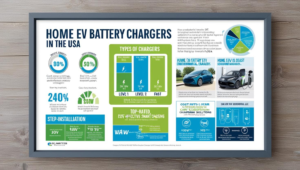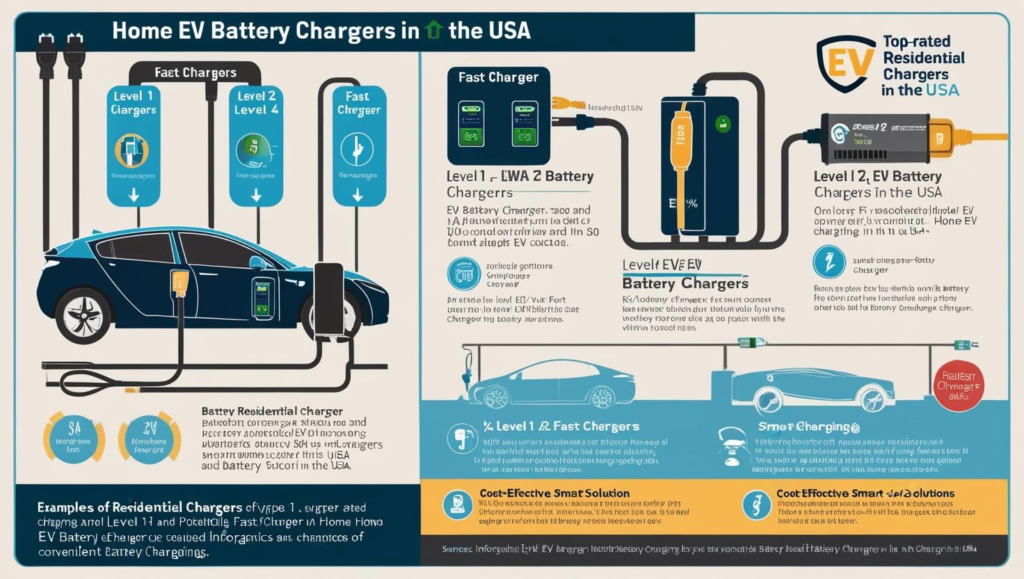Introduction
Electric vehicles (EVs) have taken the world by storm, offering an eco-friendly and cost-effective alternative to traditional fuel-powered cars. However, owning an EV comes with the need for efficient home charging solutions. In this article, we will explore everything you need to know about EV battery chargers for home use, their benefits, installation processes, costs, and why they are a must-have for EV owners in the USA.
Why Home EV Battery Chargers Are Essential
While public charging stations are widely available, having a residential electric vehicle charger is more convenient and cost-effective in the long run. Home EV battery chargers eliminate the hassle of finding a charging station and waiting for availability. Instead, you can charge your EV overnight from the comfort of your home.

Key Benefits of Home EV Charging Stations
- Convenience: Charge your EV anytime without leaving your home.
- Cost Savings: Lower charging costs compared to public stations.
- Faster Charging: Especially with Level 2 EV chargers for home, which provide quicker charging than standard outlets.
- Energy Management: Monitor and control your EV charging with smart chargers.
- Increased Property Value: Homes equipped with EV charging infrastructure are more appealing to buyers.
Types of Home EV Chargers
When choosing an EV battery charger for home use, it’s essential to understand the available options:
Level 1 Chargers
- Power Source: Standard 120-volt household outlets.
- Charging Speed: Adds 3-5 miles of range per hour.
- Ideal For: Plug-in hybrids and low-mileage EV drivers.
Level 2 Chargers
- Power Source: Requires a 240-volt outlet.
- Charging Speed: Adds 25-30 miles of range per hour.
- Ideal For: Most EV owners seeking faster charging at home.
Level 2 chargers are the best home EV chargers in the USA for their balance of speed and efficiency.
How to Install an EV Charger at Home in the USA?
Installing an EV home charging station requires careful planning. Here is a step-by-step guide:
- Assess Your Electrical System: Consult a professional electrician to ensure your home can support a Level 2 charger.
- Choose the Right Charger: Compare home EV charger prices and select one that suits your needs.
- Hire a Professional: Schedule EV charger installation services for proper setup.
- Apply for Incentives: Check for home EV charging incentives in New York, California, Texas, or your state to offset installation costs.
- Test the System: Ensure the charger functions correctly before regular use.
Top-Rated Electric Vehicle Chargers for Home Use
If you’re looking for recommendations, here are some top-rated electric vehicle chargers:
- ChargePoint Home Flex: A versatile Level 2 charger with Wi-Fi connectivity.
- JuiceBox 40: Known for its energy efficiency and smart features.
- Siemens VersiCharge: Affordable and reliable for residential use.
- Tesla Wall Connector: Ideal for Tesla owners.
- Grizzl-E Classic: Durable and weather-resistant.
Cost of Installing an EV Charging Station at Home
The cost of installing an EV charging station at home can vary based on factors such as:
- Type of charger (Level 1 vs. Level 2)
- Electrical upgrades needed
- Labor charges
On average, installation costs range between $500 and $2,000. Check for EV charging tax credits USA or state-specific incentives to reduce expenses.
Smart EV Chargers: The Future of Home Charging
Smart EV chargers for home offer advanced features such as:
- Wi-Fi connectivity
- Scheduling options for off-peak charging
- Integration with home energy management systems
These chargers are ideal for homeowners seeking energy-efficient solutions.
Home EV Charging vs. Public Charging
While public chargers are great for road trips, home EV charging options offer unparalleled convenience and cost savings. Public chargers often have higher rates and may require waiting in line, whereas a home setup ensures your EV is always ready to go.
FAQs About Home EV Battery Chargers
What is the best EV charger for home use in the USA?
The best home EV chargers in the USA include ChargePoint Home Flex, JuiceBox 40, and Siemens VersiCharge. These Level 2 chargers provide fast and reliable charging.
How much does it cost to charge an EV at home?
Charging costs depend on electricity rates and your EV’s battery capacity. On average, it costs $0.10-$0.20 per kWh, making home charging significantly cheaper than public stations.
Can I install an EV charger at home myself?
While some Level 1 chargers are plug-and-play, installing a Level 2 charger requires professional help to ensure safety and compliance with local codes.
Do I need a special outlet for a home EV charger?
Yes, Level 2 chargers require a 240-volt outlet, similar to those used for dryers or ovens.
Are home EV chargers safe for all electric vehicles?
Yes, most home EV chargers are compatible with all EVs. However, Tesla owners may need an adapter for non-Tesla chargers.
Conclusion
Investing in a residential electric vehicle charger is a game-changer for EV owners. With the growing popularity of electric vehicles, home EV charging stations are becoming a necessity for convenience, cost savings, and efficiency. From affordable home EV chargers to smart EV chargers with Wi-Fi, there’s a solution for every need and budget. Take advantage of incentives, consult professionals for installation, and enjoy the benefits of hassle-free charging from your own home.
Start your journey to seamless EV ownership by choosing the right home EV battery charger today!

